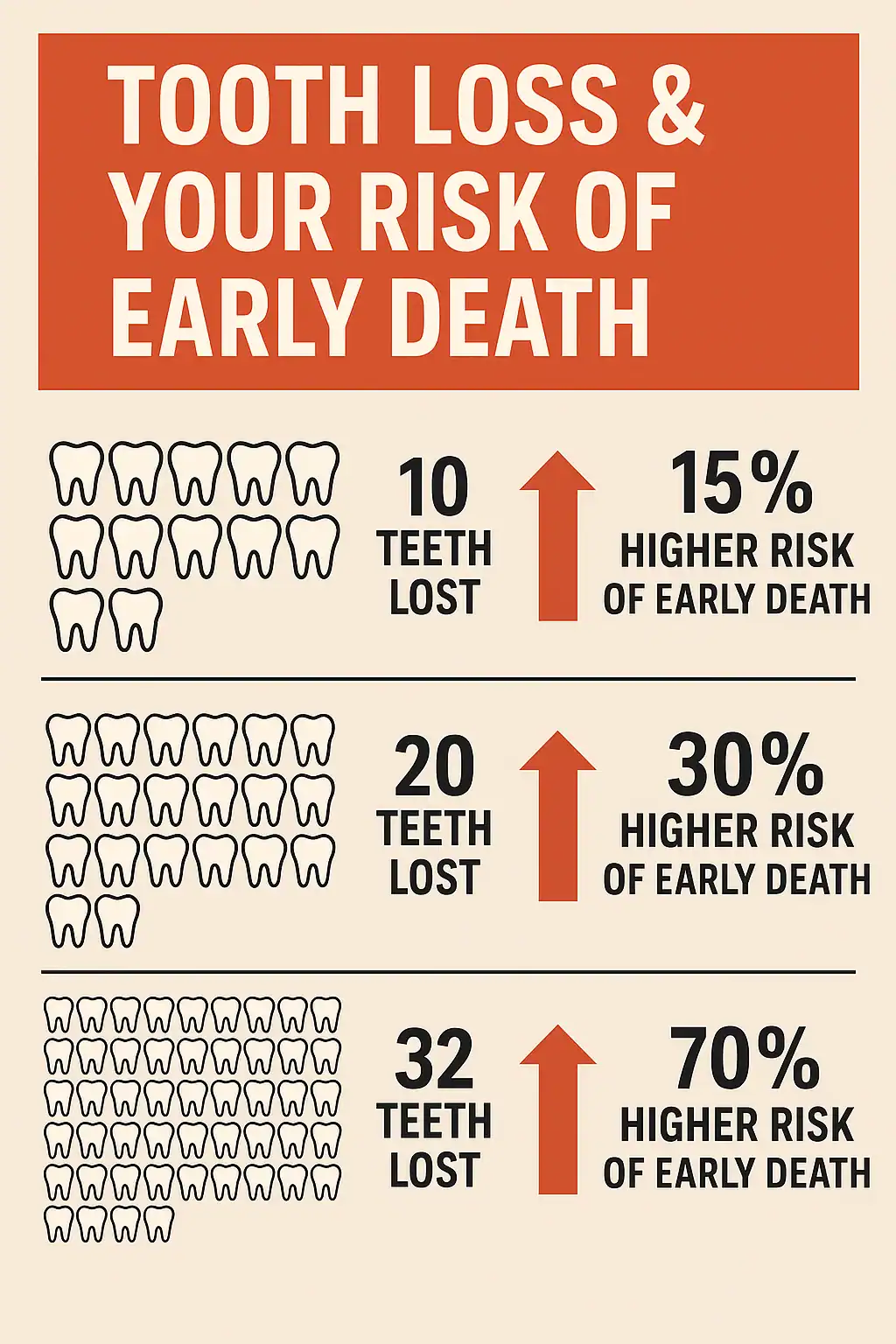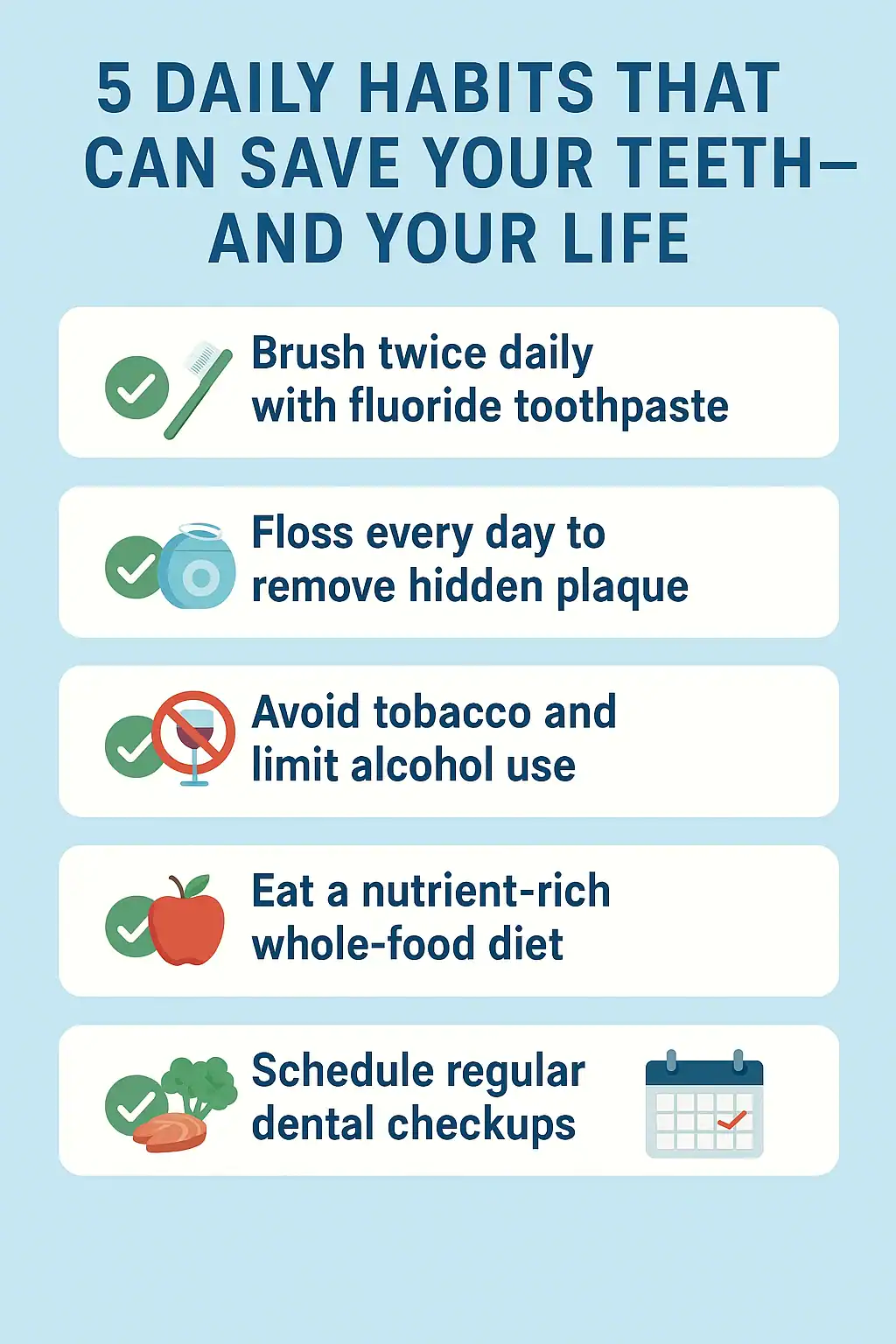Can something as simple as losing a tooth increase your risk of dying early?
It may sound unbelievable at first, but science is catching up with something many of us never even considered… Your teeth play a more significant role in maintaining your overall wellness than you might realize.
The scientific community has validated a seemingly absurd concept which many people never suspected.
The study followed a massive 306,807 people as researchers documented their health results and oral conditions together with their life expectancy across different countries and life environments.
The result?
Researchers tracked 19,000 deaths during the study period and made an unexpected discovery.
People who lost multiple teeth faced a higher danger of premature death primarily due to heart conditions.
The numbers demonstrate genuine consequences which affect actual individuals.
The practice of brushing and flossing no longer stands alone as the only oral care concern. The body demonstrates how ordinary tooth loss impacts your health from gum tissue to heart health.
What connections exist between your facial expression and your life expectancy?
Let’s dive deeper.
Key Findings from the Study
The study findings need step-by-step explanation through numerical data rather than verbal descriptions.
Here’s what the data says:
Lost 10 teeth?
Your early death risk increases by 15% when you lose ten teeth. The findings have solid statistical support. (RR = 1.15)
Lost 20 teeth?
The research indicates that losing twenty teeth elevates your chance of premature death by 33%. (RR = 1.33)
The problem affects your entire body rather than just your smile because it triggers critical warning signs.
Lost nearly all your teeth (28 to 32)?
This is where it gets serious.
The research demonstrated that dying early becomes 57% to 70% more likely. (RR = 1.57+)
Yes, that much. The findings confirm its genuine nature.
Researchers verified through their data that tooth loss creates a straight-line risk increase which grows consistently with each lost tooth.
The research did not establish a single disease connection.
The connection was clear for:
- All-cause mortality
- Coronary heart disease (CHD) deaths
The link between tooth loss and cardiovascular disease (CVD) was present but showed inconsistent results among different study groups.
Every tooth matters.
Your mouth functions as a vital part of the body system which operates as a whole unit. The system maintains a record of your performance.

Why Tooth Loss Might Increase Mortality Risk
So, what’s really going on behind the numbers?
The effects from mouth-related conditions extend beyond the mouth to affect the complete body structure.
Let’s examine three fundamental factors which explain how tooth loss might result in elevated mortality rates.
It All Starts With Nutrition
Losing teeth makes eating harder.
The process of chewing becomes unpleasant. Certain foods become impossible.
And what are the first things to go?
- Crunchy apples.
- Leafy greens.
- Raw veggies.
- Nuts and seeds.
- High-fiber whole grains.
The foods which benefit your heart and immune system become unavailable due to these conditions.
People with few teeth tend to replace their normal diet with:
- Processed soft foods
- Sugary snacks
- Refined carbs
- Low-nutrient meals
The result?
Poor nutrition. Weakened immunity.
Higher inflammation.
The heart remains the target of this damage.
Inflammation That Doesn’t Quit
Tooth loss isn’t always just about age or accidents.
Periodontal disease progresses to tooth loss as its terminal phase when it creates destructive inflammation in gums and destroys bone structures.
And here’s the dangerous part:
The infection from the mouth does not remain confined within the mouth.
Bacteria invade the bloodstream before they quietly move throughout the entire body.
Your immune system activates but continuously fighting leads to an inflammatory response that persists.
The risks emerge at this point. Long-term inflammation has been linked to:
- Atherosclerosis (clogged arteries)
- Heart attacks
- Strokes
- Certain cancers
All from bacteria that may have started at your gums.
More Than a Dental Issue
Tooth loss develops gradually throughout several years. Health problems that develop across an entire life span usually lead to tooth loss.
- Early tooth loss occurs primarily among people who:
- Failed to maintain proper oral hygiene practices
- Had restricted access to medical care
- Held either a lower education level or income status
Battled with chronic conditions like:
- Diabetes
- High blood pressure
- Smoking or obesity
Dental tooth loss functions as an external indicator that reveals internal body health conditions.
It’s not just about teeth.
It’s about everything connected to them.
A Global Perspective – The Pattern Is Everywhere
The issue exists beyond any particular geographic area. The connection between tooth loss and early death proved to be worldwide in scope.
The world shared the same warning message:
Fewer teeth = higher risk.
Here’s what the study found:
Europe
Research showed that complete tooth loss increased early death risk by up to 78 percent.
Missing teeth create eight out of ten serious health risks according to this finding.
America & Australia
Same story, same trend.
Tooth loss established a persistent relationship with premature death which showed its strongest connection to heart-related mortality.
Asia
The relationship was somewhat less intense but still presented a substantial concern.
Research revealed a major boost in danger when teeth vanished from the study sites.
What does this mean for you?
All regions share this crucial life lesson:
Your teeth aren’t just for chewing or smiling.
The scientific evidence demonstrates that your teeth serve as vital life connectors.
What You Can Do
Good oral hygiene practices serve two purposes because they create healthy smiles and protect your body as a whole. The American Dental Association (ADA) states that brushing teeth twice daily with fluoride toothpaste proves to be effective in strengthening tooth enamel while reducing cavities by up to 25%. The fluoride treatment helps rebuild tooth enamel so teeth become better at fighting tooth decay.
Daily flossing is equally important
Scientific evidence demonstrates that daily flossing helps clear food particles and plaque from between teeth where toothbrushes cannot access thus preventing gum disease which leads to tooth loss.
Tobacco use combined with moderate alcohol consumption helps protect your oral health. The use of tobacco increases dramatically the risk of developing gum disease, oral cancers and results in tooth loss. According to the Centers for Disease Control and Prevention (CDC) the consumption of heavy amounts of alcohol worsens oral infections and leads to dangerous changes in mouth tissues.
The consumption of whole foods that contain omega-3 fatty acids and antioxidants together with vitamins C and D will help protect your gums while minimizing the inflammation that leads to periodontal disease.
Regular dental checkups remain necessary even when you show no signs of illness. Early diagnosis of gum disease and tooth decay enables prompt medical action that prevents further complications.
Early treatment of gum disease
It helps protect your teeth while also reducing your risk of heart disease and diabetes, due to the strong connection between oral and systemic health.

| What You Can Do | Why It Matters | Scientific Insight |
|---|---|---|
| Brush twice daily with fluoride toothpaste | Strengthens enamel and prevents cavities | ADA: Fluoride reduces cavities by up to 25% |
| Floss daily | Removes plaque and debris between teeth where brushing can’t reach | Flossing reduces gum disease risk by removing hidden plaque |
| Avoid tobacco and limit alcohol | Reduces risk of gum disease, oral cancer, and tooth loss | CDC: Tobacco and heavy alcohol use increase oral cancer and gum disease risk |
| Eat a whole-food diet rich in anti-inflammatory nutrients | Supports gum health and reduces chronic inflammation | Nutrients like omega-3, vitamins C and D help combat periodontal inflammation |
| Get regular dental checkups even if you feel fine | Enables early detection and treatment of dental issues | Early intervention prevents serious problems and tooth loss |
| Address gum disease early | Preserves teeth and lowers risk of systemic diseases like heart disease and diabetes | Studies link untreated gum disease with increased risk of cardiovascular disease and diabetes complications |
Your dental health directly affects your future life expectancy while serving as an essential factor for sustaining your overall wellness.
Your mouth serves as the gateway to reveal how well your body is doing. The maintenance of your oral health leads to both a longer life expectancy and better overall well-being.
Each tooth holds importance because they link to your heart, your immune system, and your future health.
Excellent article thank you